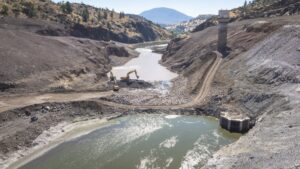FEMA has secured about 1,500 properties for long-term housing for fire victims but only about a third are in West Maui.
Cynthia and Terry Shibao took temporary shelter with their two teenaged kids at the Hyatt Regency Maui Resort and Spa in Kaanapali soon after their multigenerational home in the heart of Lahaina burned down in the Aug. 8 fire.
After six long months crammed in a hotel room with no ability to cook, the Shibao family finally got the news they had been hoping for last week: The Federal Emergency Management Agency could place them in a three-bedroom home in Lahaina through its direct-lease program.
This successful matchmaking needs to happen hundreds of more times in the next two months with 4,000-plus fire survivors still living in 16 hotels and the temporary emergency housing program scheduled to end on April 10.
But as difficult as it has been for FEMA to secure 1,495 units, including enough that accept pets and meet Americans with Disabilities Act standards, it is proving to be equally challenging to get survivors to move into the more stable and comfortable housing.
Many households are turning down the units they are offered because of the location.
“We stood firm and said we really needed to stay in Lahaina,” said Cynthia Shibao.
Their kids attend Lahaina schools, her husband coaches wrestling in Lahaina, both adults are in the process of replacing their lost jobs and they share an “unreliable van” with 109,000 miles.
“It’s really more than logistics and geography, it’s the community,” she said. “You take the people out and you don’t have Lahaina.”
Shibao said her family was willing to live in a two-bedroom or even a one-bedroom unit if it meant they could stay in West Maui. But she said she was told that under the U.S. Department of Housing and Urban Development rules governing federal housing that they had to have a three-bedroom unit because their school-age children were of different genders. That rule is spelled out on HUD’s website as well.
So far only 219 of the 1,196 eligible households now live in direct-lease properties, despite many units being available for weeks. That includes a remodeled two-bedroom condo in Kihei with an ocean view that has been sitting empty for more than a month.
The direct-lease units are furnished, complete with kitchenware and bedding, and are free to the survivors, with the rent and utilities paid directly by FEMA. There are no financial background checks.
Bob Fenton, who is heading the Maui wildfires recovery efforts for FEMA, says he is sympathetic for survivors.
“I can’t imagine what individuals are going through. People have lost their whole house. They’ve been separated from their friends. They’ve lost family members,” he said last week. “But all I can do is provide what’s available now in this new normal.”
Roughly 4,000 housing units were lost in the wildfires, exacerbating a housing crisis that existed in West Maui long before the fires struck.
At a recent community meeting in Lahaina, Mayor Richard Bissen, Fenton and other officials patiently listened for more than seven straight minutes as one Lahaina resident voiced his frustration trying to get help after being told by a a caseworker from the American Red Cross, which is running the emergency housing program for the state, that his family would lose their hotel room if they didn’t accept a direct-lease unit offered in Wailuku in Central Maui.
It’s about 23 miles from Lahaina to either Wailuku or Kihei, which takes roughly 45 minutes along a sometimes winding coastal road that can be shut down for accidents and is difficult for some to navigate at night.
The resident at the meeting said it was not doable for his family with young children that shares one car.
Fenton said this week that they were able to help that man get his family into housing that worked for them.
“So while we will work with individuals to the greatest extent we can, we also have to understand that there’s going to be limitations by what’s available,” Fenton said. “And those limitations are real.”
Only about a third of the secured units are in West Maui. The rest are divided between Central and South Maui. FEMA is trying to lease about 100 more units in West Maui.
The most vulnerable residents, including the elderly, those with medical issues and people with young children, are being prioritized for West Maui units.
“We want you in a safe, reliable, sustained housing unit for some period of time until we can start the rebuild of Lahaina,” Fenton said at the meeting.
But he added: “If at the end of the day someone chooses not to take a unit because of a 30-minute drive or 45-minute drive, that’s their choice.”
It has not been easy to secure the direct-lease units, which are being handled by three mainland property management companies after no local companies responded to a request for quotes, Fenton said.
To entice owners of vacation rentals to rent long-term to survivors, Maui County passed a bill to exempt their property taxes for a year to 18 months.
Figuring it was a win-win, remote worker Kristina Paras put her two-bedroom condo in Kihei into the direct-lease program and will relocate to the mainland for up to two years so a survivor can stay in her place. With the revenue more than covering her expenses, she said she can afford to do so.
The process included her replacing a queen bed with two singles, making minor repairs and meeting other requirements. But so far, more than two weeks after it became available to be moved into, nobody has.
Fenton said about 500 households have been matched with direct leases, and are waiting background checks and other paperwork, with about another 100 ready to be leased in the coming week.
The background checks are required and obtained by the property managers.
Although the hotel program does not officially end until April 10, people who turn down direct-lease units can be required to leave sooner. Fenton said there are around 20 households that are currently in that situation after “we had multiple discussions with them.”
People who decline FEMA- or American Red Cross-funded housing on Maui can appeal to the Hawaii Emergency Management Agency, which makes a decision within two days. If the appeal is denied, the household has seven days to move out of the temporary sheltering site, according to Mary Simkins, a spokesperson for the Red Cross’ Maui wildfire response.
Fenton said people who stay in hotels past the deadline will not be reimbursed by FEMA.
The governor’s office said Wednesday that it may ask FEMA for an extension of the April 10 deadline for housing in hotels. But for now the state is continuing to work with FEMA to transition survivors into other interim housing and with other agencies and nonprofits on a variety of housing projects.
FEMA also is still offering rental assistance, in which individuals can rent a place on their own and then get reimbursed up to 175% of fair market value. About 269 households have received continued rental assistance and 144 are pending approval.
Some people are not eligible for the direct-lease program, including those whose identity has not been verified, people with criminal backgrounds and people who cannot demonstrate they lived in Lahaina at the time of the fire.
While people with living expense insurance are not technically eligible for the direct-lease program, if they can’t find a unit to lease themselves, they can receive a direct-lease unit, with FEMA charging them 100% fair market value. Once their insurance runs out, they can remain in the direct-lease unit.
Fenton said FEMA wants to maintain a surplus of direct-lease units, with the anticipation that they will be needed for people whose living expense coverage runs out.
For everyone who is getting FEMA housing assistance, progress must be shown each month toward rebuilding their home or finding a place to rent.
And as expensive as it is to house people in hotels at more than $300 per night and direct leases going for $8,000 a month for a two-bedroom condo on Maui, it is still much cheaper than building group sites, which require preparing the land, building infrastructure, installing utilities, and purchasing and installing the housing units.
But Fenton said FEMA is probably going to build one group site in West Maui for a projected 150 to 160 households that will need a temporary unit because a direct-lease unit didn’t work out, including failure to pass a criminal background check.
Civil Beat’s coverage of Maui County is supported in part by a grant from the Nuestro Futuro Foundation.




